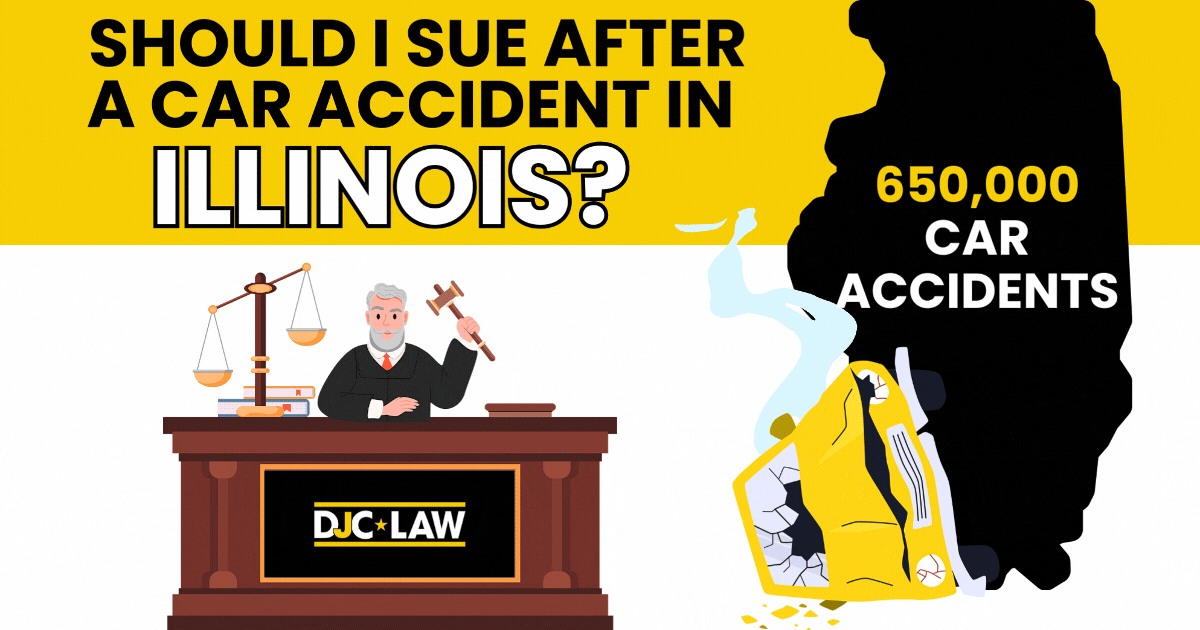
Driving carefully doesn’t stop you from being the victim of a car accident in Illinois. According to Make Roads Safe, Chicago alone saw 658,000 car accidents last year. Unfortunately, Illinois is a haven for car accidents, with thousands of Americans injured and killed every year. The question is, “Should you sue after a car accident?”
Suing after a car accident is one way to hold poor drivers to account for their actions. However, every accident is unique, and you must ensure you’re making the right decision for you and your family. If you have sustained a personal injury then Chicago personal injury lawyer can help you find a solution.
In this guide, we’ll discuss which aspects to consider if you’ve been involved in an accident and you’re weighing up whether to enlist a personal injury attorney to help you sue.
Key Takeaways
-
Suing after a car accident makes sense in most cases because it enables you to gain your rightful compensation, cover your losses, and hold the other driver to account.
-
Your settlement covers your economic and non-economic losses, including lost wages, medical expenses, and pain and suffering.
-
Victims of accidents are entitled to sue for property damage even if they haven’t suffered any bodily injuries.
-
The success of your claim depends entirely on your ability to gather and present evidence proving the negligence of the other driver and demonstrating your losses.
-
In all cases, it’s best to hire a car accident lawyer to pursue your case and increase your chances of getting the outcome you want.
Is It Worth It to Sue After a Car Accident in Illinois?
Deciding whether to sue depends on several factors. Two primary factors are the settlement offered by the other driver’s insurance company and the issue of who was liable for the accident.
Firstly, you must determine whether filing a lawsuit is worth it. If your case value is roughly the same as the settlement offered, filing a lawsuit makes little sense. After all, accepting a settlement provides a guaranteed sum, whereas car accident lawsuits could go the other way and leave you with nothing.
The second issue is liability. Illinois operates under at-fault laws, meaning liability must be proven, and the at-fault driver’s insurance company compensates your losses. You must have the evidence to prove liability when you’re injured in an auto accident.
Understand that Illinois also operates under comparative negligence laws, meaning if you’re considered 51% or more responsible for the accident, you lose your right to claim monetary compensation.

For example, if you were drunk driving, speeding, and driving recklessly when you crashed into a parked vehicle, it’s unlikely you’ll be able to claim anything at all. In this case, you likely wouldn’t sue because the comparative negligence laws would almost certainly bar you from receiving monetary compensation.
Both of these factors necessitate a visit to a car accident attorney. They’ll assess your case and the available evidence to determine whether it’s worth suing after your accident.
Why It’s Worth it to Sue After a Car Accident (In Most Cases)

Suing after a car accident entitles you to the maximum compensation and protects your rights. Most scenarios make it well worth suing because the payout from a lawsuit will eclipse any initial insurance settlement offer.
In addition, suing is essential to ensuring that the roads are safer for everyone. According to WGN-TV, Illinois has seen the third-largest increase in car crash deaths nationwide. Taking legal action holds drivers accountable for their actions. Consulting a trusted Chicago car accident lawyer ensures you have expert guidance to maximize your compensation and navigate the legal process effectively.
Here are just some of the reasons why it’s worth suing.
Recover Full Compensation
Car accidents often lead to accident victims paying substantial medical bills and taking time off work to heal from their injuries. Insurance companies will always try to lowball you because they want to pay as little as possible.
Filing a lawsuit against the other driver’s insurer is your first step to recovering the full amount you’re entitled to. According to Nolo, the median personal injury settlement in 2024 is around $75,000.
Deal With Insurance Companies
Insurance companies are not your friends and will do everything possible to minimize how much they pay. Your settlement offer will unlikely cover your expenses, but hiring an attorney means you won’t fall victim to their tricks. Essentially, getting an attorney on your side levels the playing field.
Prove Liability
At-fault drivers may deny they had anything to do with an accident, and their insurance company will back them up. Proving liability is complex for car accident victims, but by filing a lawsuit, you have a legal professional who can gather evidence and put it together as part of a strong case.
Compensate Your Non-Economic Damages
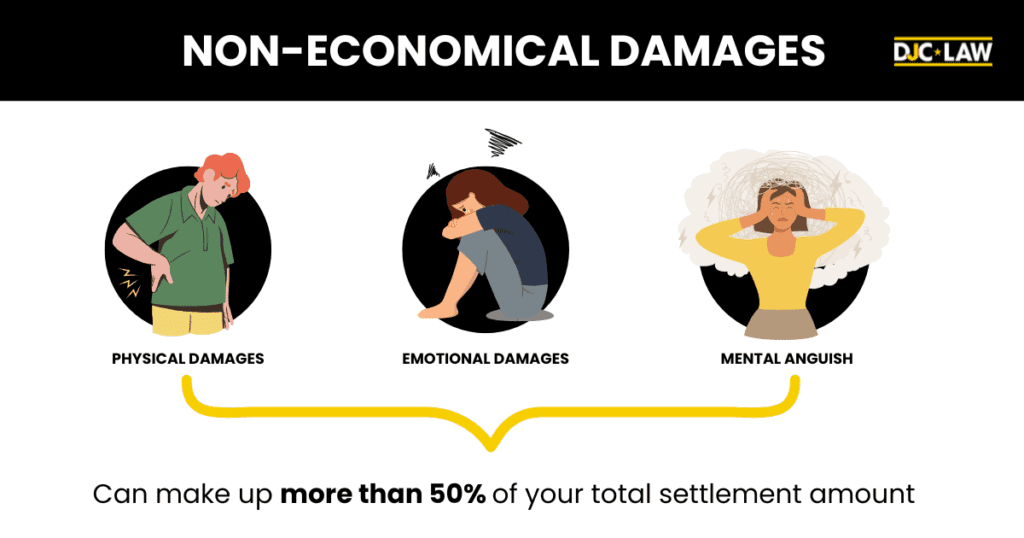
Insurance settlements often focus on economic damages because these are easily provable by looking at medical bills and pay slips. However, these represent a small part of what you could be entitled to.
Non-economic damages, such as your physical, emotional, and mental anguish (known as pain and suffering), are also claimable. Due to the modifiers used, pain and suffering may make up more than 50% of your total settlement amount, which you can access by filing a lawsuit.
Demanding Accountability
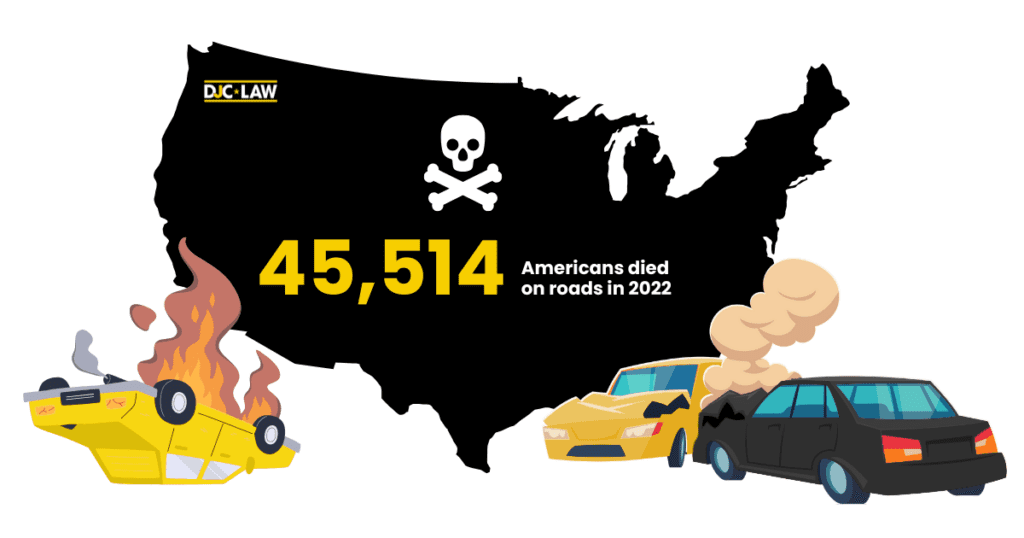
Suing someone is about more than the money. It’s about holding the at-fault driver accountable for their actions. With the IIHS reporting that 42,514 Americans died on the roads in 2022, unsafe driving behaviors must be held to account.
Filing a lawsuit brings attention to the issue and ensures the responsible party doesn’t get off lightly for causing your injuries.
Gain Peace of Mind

All accidents are traumatizing. According to the National Institutes of Health, up to 48% of victims in motor vehicle crashes have some form of Post-Traumatic Stress Disorder (PTSD), with many struggling to recover for years.
Handing your car accident case over to a lawyer enables you to get the time and space you need to recover from your injuries instead of fielding calls from insurers, worrying about your case, or figuring out how you’re going to pay your ongoing medical costs.
What are the Financial Costs of Car Accidents?
Car accidents can lead to substantial losses for victims. Depending on the nature of your injuries, you could face six-figure medical expenses, loss of wages, and the costs of repairing your car and other property damage in the accident.
Additionally, it’s crucial to remember that some people never fully recover from motor collisions. This can result in ongoing medical costs, including therapy. Plus, some people sustain such significant injuries that they require extensive home and vehicle modifications.
Your economic losses can continue to climb if you’re prevented from returning to work at all. Most law firms focus on lost wages, but catastrophic injuries could derail your career permanently. Filing a personal injury lawsuit lets you claim not only for lost wages but also lost earnings potential if you cannot return to work.
All this is before going into the non-economic losses you can claim, including pain and suffering, loss of enjoyment of life, and loss of companionship.
Who Pays My Lost Wages and Medical Expenses?
Medical expenses and lost wages are covered by the other driver’s insurance company in Illinois because the Land of Lincoln is an at-fault state. While your case is pending, you must pay out-of-pocket or opt for other measures.
Understand that insurers know the financial strain that a pending lawsuit can put on a car accident victim. That’s why they commonly lowball victims, hoping that they’ll take the bait. Filing a lawsuit is challenging, but it’s the best outcome for covering your financial needs in the long run.
So, what can you do to pay your bills in the meantime if you can’t return to work and you’ve got a hefty medical bill? Unfortunately, you’re responsible for all your expenses while a civil case is ongoing. Some of the options available to you include:
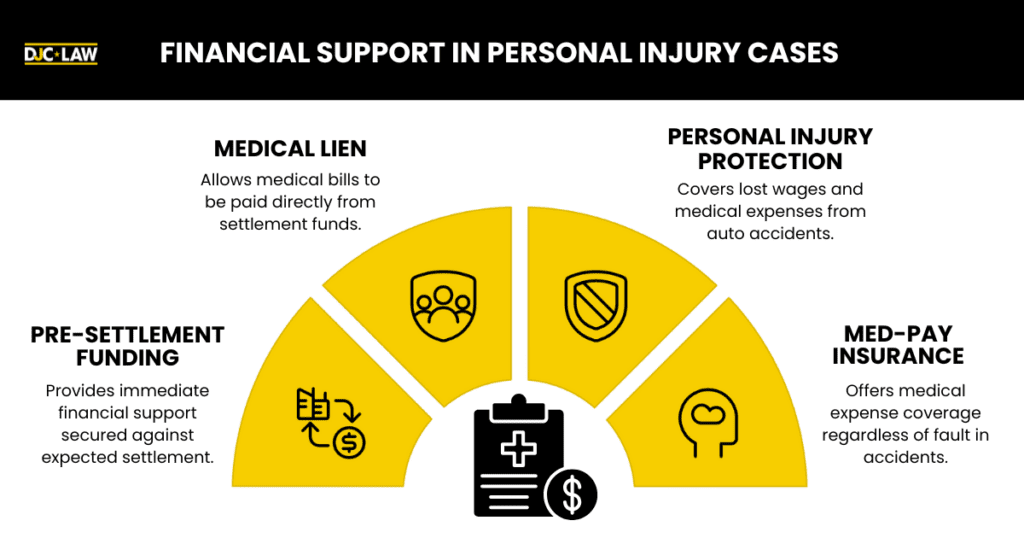
-
Pre-Settlement Funding – Law firms often offer pre-settlement funding to help you cover your expenses while your case is ongoing. Essentially, this loan is secured against your expected settlement, and the repayment is subtracted from your final award.
-
Medical Lien – A medical lien is an agreement between your legal team and medical provider to help you cover your bills. Your lawyer will pay your medical provider directly from your settlement once your case has been settled.
-
Personal Injury Protection (PIP) – PIP is no-fault insurance that covers lost wages, medical expenses, and various other costs relating to auto accidents. Note that PIP isn’t available in all states, but it’s an optional extra in Illinois.
-
Med-Pay Insurance – Med-Pay coverage is available in Illinois to support you with your ongoing medical expenses. It’s a type of insurance that covers your medical bills regardless of who’s at fault for an auto accident.
Talk to your attorney to learn more about your options if you’re struggling to pay your bills while waiting for your settlement to come through.
Is It Worth Suing After a Car Accident If I Am Not Injured?

Suing after an accident can still make sense even if you haven’t sustained any bodily injuries. You may still require mental health treatment and damage to your vehicle that needs to be repaired. Whether you sue without bodily injury depends on the extent of your other damages.
Although Suburban Chicagoland reported that Illinois has the fifth deadliest road system in the country due to poor road design, most accidents are relatively benign. You may have nothing more than a minor sideswipe or a fender bender that doesn’t lead to any injuries whatsoever. In this case, you’d file a property damage-only lawsuit.
These lawsuits are less common but equally valid for covering your losses. Despite this, you may still have some latent injuries. Some injuries only surface days or weeks after the incident, so don’t immediately assume you’re unhurt after walking away from an accident. Consult with a lawyer early to account for these injuries that might not appear until later.
Can I Sue for the Damage to My Car?
Suing for damage to your car without bodily injury is a property damage-only lawsuit. These lawsuits tend to arise when victims were parked but not in the car at the time of the crash. You’re entitled to sue for any damage to your car, including whether it’s repairable or totaled.
Assessing the value of your personal injury claim is relatively simple if your car has been totaled because it’s possible to look at the fair market value of the vehicle. On the other hand, several factors influence how much you could be entitled to if it can be repaired.
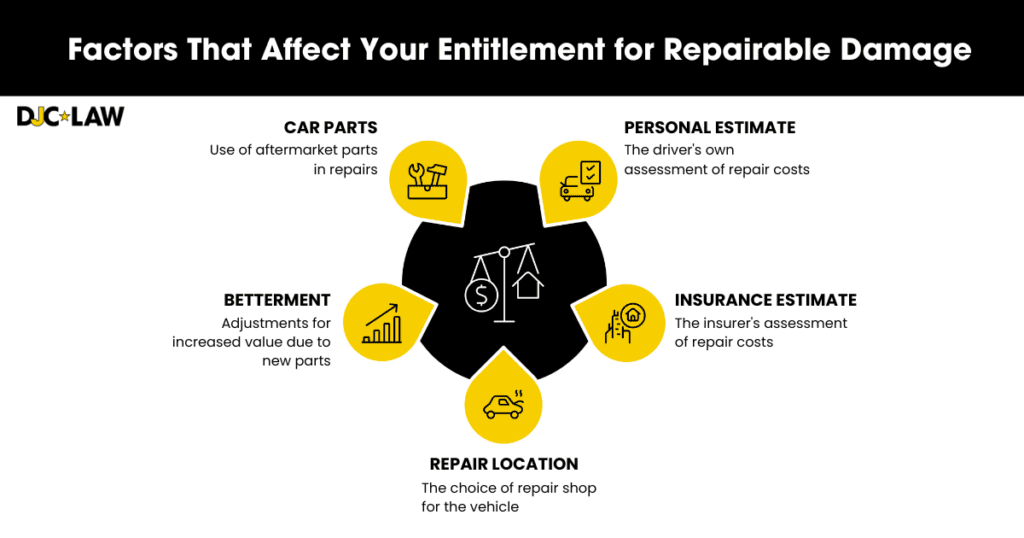
Here’s what to know:
-
Your Estimate – You’re entitled to your own estimate and should get an estimate from a reputable mechanic.
-
Insurance Estimate – The insurance company is also entitled to get an estimate. They’ll usually send out an insurance adjuster or take the vehicle to a specific body shop. Occasionally, they might do both.
-
Repair Location – You’re free to get your car repaired anywhere you like, but the insurer will only pay for an appropriate estimate. Settlements are almost always lower than driver estimates because insurers often negotiate special deals with specific body shops.
-
Betterment – Betterment is a concept used against older vehicles to lower the final estimate. Insurers can claim that repairing an old car with brand-new parts increases the vehicle's value, and therefore, the value of your claim should be lower.
-
Car Parts – Insurance companies can use aftermarket parts for your repairs. The only rules in place from the Federal Trade Commission are that any aftermarket parts mustn’t void the car’s warranty and must be identified in the estimate.
What if I Suffered Emotional Distress from the Car Accident?

Suing for emotional distress is perfectly valid. It’s a concept known as “pain and suffering” and accommodates physical, mental, and emotional anguish you may have suffered due to your collision. You can include it in your claim as part of your non-economic losses.
Pain and suffering may make up more than 50% of an eventual settlement because of the modifiers used to assign a dollar value to it. But you can’t just say you’re distressed and deserve a big settlement check.
Emotional distress must be proven with medical evidence. For example, if you’re now taking regular therapy sessions in the aftermath of your accident, this would serve as evidence of your emotional distress. On the other hand, your personal injury lawyer might call in an expert witness, such as a psychologist or psychiatrist, to confirm that you’ve developed a form of PTSD after your accident.
Either way, countless options exist for using medical evidence to prove emotional distress. The bottom line is that any claim you make must be backed up by verifiable evidence.
How to Sue for a Car Accident in Illinois

Suing for a car accident in Illinois can be done by filing your own case or getting a car accident attorney to do it for you. In all cases, hiring a lawyer is the smart way to initiate the claims process.
At the beginning of the claims process, you’ll tell your lawyer exactly what happened and the damages and injuries you sustained. It’s also your opportunity to provide any evidence you may have gathered from the scene, including photos and videos.
Your Chicago car accident lawyer will take complete control of your case and handle all communications with other parties. Depending on the complexity of your case, your lawsuit may take anywhere from a few weeks to a few months to resolve.
How Long Do I Have to File a Car Accident Lawsuit in Illinois
Filing your case must be done within the Illinois personal injury statute of limitations. Currently, Illinois has a two-year statute of limitations on filing personal injury cases. You'll lose the right to sue entirely if you don’t file your case in time.
The two-year clock begins from the day your accident occurred and can only be paused in specific cases, such as if the victim was a minor or the other driver left the state. Note that the statute of limitations only applies to the case filing, not case completion.
What You Need to Prove to File a Car Accident Claim
All car accident claims rely on evidence to prove that the action or inaction of the other party caused your injuries and losses. You can never have too much evidence to demonstrate the validity of your case, which an attorney will support you with.
Firstly, four key elements must be proven:
-
The driver owed you a duty of care.
-
The driver breached their duty of care.
-
The driver’s actions/inactions led to the crash.
-
The driver caused you to suffer losses as a result of the accident.
Proving these four elements determines whether you’re entitled to monetary compensation. If you can’t prove these elements, your claim will be denied, and you won’t receive a settlement.
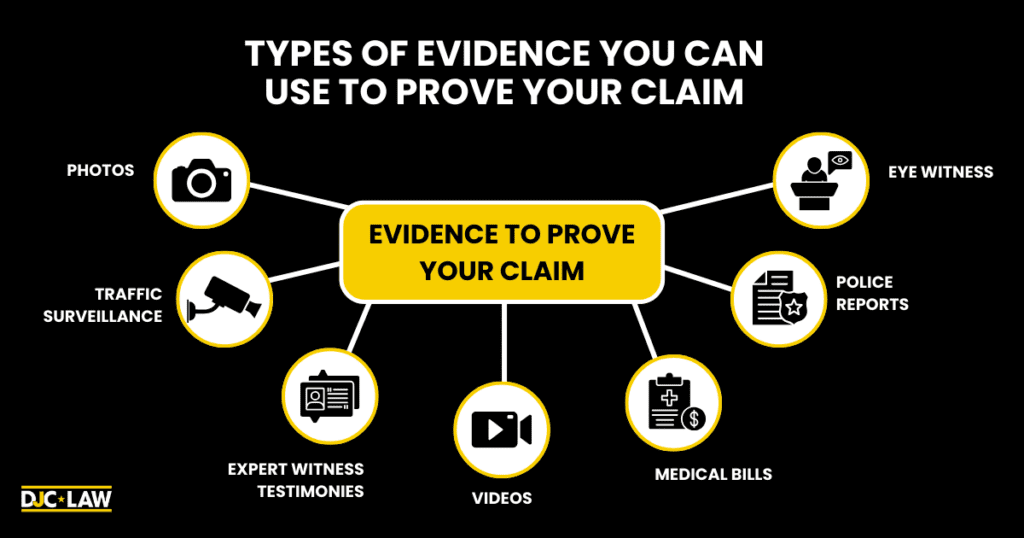
Examples of the types of evidence you can use to prove your claim include:
-
Photos taken from the accident scene.
-
Videos taken from the accident scene.
-
Eyewitness statements, backed by contact details.
-
Official police accident reports.
-
Medical bills.
-
Expert witness testimonies.
-
Traffic surveillance camera footage.
Some of this evidence you might already have in your possession, but others may need to be obtained, such as surveillance camera footage. This is part of your attorney’s job, and they’ll go through the proper channels to obtain all the necessary evidence.
Do I Need a Lawyer to Sue for a Car Accident?
No requirement exists to hire a lawyer to sue someone after a car accident. However, it’s always the best possible option. The at-fault driver’s insurance company will have a team of lawyers. Do you think you can outwit them in negotiations or a court of law if the claim goes to trial?
Lawyers bring unrivaled expertise to the table. Moreover, they have the experience to know the tricks that insurers will attempt to utilize to minimize the final settlement. Plus, if your case has to go to court, they’ll help you navigate the complex rules and procedures of pursuing a trial.
In short, there’s never a reason not to hire a lawyer when pursuing a car accident claim. It’s a false economy to handle it yourself because even if you get a settlement, it’ll make up a fraction of what you could have if you had hired a professional.
Illinois Car Accident Claims FAQs
If I was at fault, can I still recover compensation?
It depends on your insurance coverage. For example, if you hold collision coverage, your car will be repaired regardless of who was at fault. Likewise, PIP coverage will cover your medical bills in all circumstances. However, if you only have liability insurance, you’ll have to cover your expenses out of your own pocket.
How is fault determined in a car accident in Illinois?
Insurance adjusters from both drivers’ insurance companies are responsible for investigating the accident and deciding who was at fault. It’s their job to review all available evidence and interview different parties to make an educated assessment.
Drivers are free to disagree with their conclusions, but they must provide verifiable evidence as to why. Working with a lawyer who understands the fault determination system enables you to make a more effective claim and challenge any inaccurate conclusions.
Is Illinois a no-fault auto accident state?
No, Illinois is an at-fault state. Otherwise known as a “tort” state, car accident costs are assigned to the responsible party. It’s why the Prairie State requires all drivers to have a minimum level of liability insurance before taking to the roads by law.
If you’re found to be at fault for an accident, your insurance company must pay the agreed settlement. On the other hand, if the other driver was at fault, their insurer must pay the settlement. The system contrasts with no-fault states, where your own insurance company pays all costs regardless of fault.

